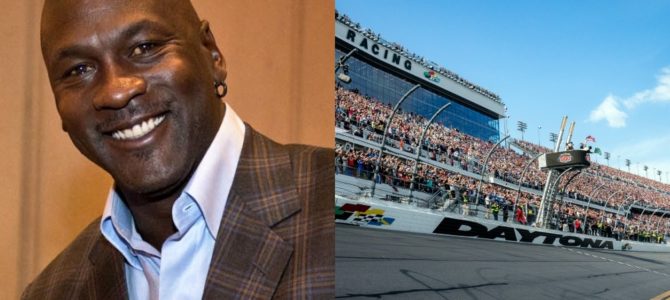
For the third time in less than six months, NASCAR has made national news. One of the first sports leagues to announce a return to competition after the coronavirus hit, stock car racing’s sanctioning body banned the Confederate flag at NASCAR events in June, grabbing headlines in the aftermath of George Floyd’s killing and a series of racial protests.
On Monday evening, the sport announced that NBA Hall of Famer Michael Jordan had agreed to acquire a team, which would feature the sport’s lone African American driver, Bubba Wallace. Wallace, who through this year has driven for stock car racing’s “King,” Richard Petty, now will race for an owner with a brand that extends far beyond the racetrack. The involvement of the global sports icon turned billionaire businessman suggests a sport intending to broaden its fanbase and reach.
Carolina Roots — But Broader Appeal
In a press release announcing the move, Jordan noted, “I’ve been a NASCAR fan my whole life.” Growing up in Wilmington, North Carolina — the heart of traditional stock car country — his parents would take Jordan and his siblings to races, which led to his interest in the sport.
The announcement of Jordan’s majority stake in the acquired team does not represent the first instance of a black American owning a NASCAR franchise, nor even the first black American basketball player to do so. Brad Daugherty, a teammate of Jordan’s at the University of North Carolina, and a later rival during playoff clashes between Daugherty’s Cleveland Cavaliers and Jordan’s Chicago Bulls, has served as a NASCAR owner since 1997, shortly after he retired from pro basketball (Daugherty said he even chose his jersey number with the Cavaliers, 43, after Petty, his favorite sportsman).
Both Daugherty (born in Asheville, North Carolina) and Jordan grew up following stock car racing, but say the NASCAR community hadn’t always made them feel welcome. Years before this spring’s ban on the Confederate flag, Daugherty said that seeing the banner at race events made his skin crawl. Jordan’s statement Monday noted, “Historically, NASCAR has struggled with diversity and there have been few black owners.”
Social Activism
Jordan also pointed out that “NASCAR is evolving and embracing social change more and more.” The comments seem somewhat ironic for Jordan, as this spring’s documentary “The Last Dance” noted how the superstar shied from political or social causes during his playing days. As a consummate — some might say obsessed — competitor, Jordan the player focused on basketball to the exclusion of much else.
By contrast, Wallace has taken an outspoken stance on social justice issues. This past June, his comments on the Confederate flag propelled NASCAR’s ban, and he has spoken out in favor of the Black Lives Matter movement.
Wallace’s comments led to a backlash when claims of finding a “noose” at Talladega Superspeedway led to online taunts comparing the driver to Jussie Smollett. When Wallace didn’t even find the noose in question, the comparisons seemed inapt and the response to the event stemmed more from NASCAR officials jumping to conclusions about racial animus behind the incident than anything Wallace did.
Impact on Racing
Away from the ongoing debates about race and politics, NASCAR fans might wonder about the impact the new team will have on the track. While the national press focused on Jordan’s involvement, stock car fans noted that Denny Hamlin, a fellow driver, will take a minority ownership stake in the new team (Hamlin and Jordan have known each other for more than a decade; the Jordan brand has sponsored Hamlin’s car for years). NASCAR previously stated that drivers for one team could take ownership stakes in other teams, but the move raises obvious questions about the competition that the series will need to police.
Another big question mark is whether and how a new, single-car operation can join the ranks of NASCAR’s elite teams. At present, most top-notch teams have at least two, and in most cases three or four, cars in their lineup, to exploit economies of scale. Despite the impressive pedigree of its founder, Wallace’s current team — Richard Petty Motorsports — faces resource constraints due to its smaller budget and size as well as the fact that it only runs Wallace’s car.
To borrow a baseball metaphor, simply due to its size a single-car team already faces a strike or two against it. Undoubtedly, Jordan’s name and brand can attract new corporate sponsors, leveling the financial playing field with other teams. But whether his team can overcome other structural obstacles to put Wallace in a position to regularly contend for race wins remains to be seen.
Regardless, Monday’s news provides a welcome boost of attention — and likely a boost of dollars — to the sport, a development all stock car fans can welcome.









